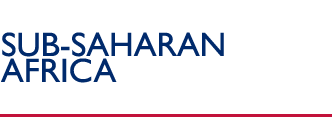USAID/Southern Africa
USAID's Strategy in Southern Africa
The United States has four main interests in Southern Africa:
increasing trade and strengthening economic ties with the region,
mitigating the region’s HIV/AIDS crisis and recurrent
food insecurity, and strengthening democracy to reduce the risk
of conflict in the region.
EXPANDING TRADE IN SOUTHERN AFRICA
Southern African countries recognize that increased trade and
open markets are the drivers of economic growth and poverty
reduction. However, because of policies and regulations that
constrain trade and increase costs, the region is not competitive
in world markets. In addition, the private sector needs help
to produce goods and services that meet the standards of global
markets. USAID established the Southern Africa Global Competitiveness
Hub (the “Trade Hub”) in Gaborone, Botswana, in
June 2002. The Hub builds regional capacity for negotiation
and implementation of trade agreements. An Africa Growth and
Opportunity Act (AGOA) advisor at the Trade Hub facilitates
U.S.-Southern Africa business links and advises on national
AGOA export strategies. In the priority sectors of agribusiness,
textiles and apparel, and tourism, the Trade Hub identifies
bottlenecks to market growth and promotes international business
links. The Trade Hub supports regional efforts to reduce high
transaction costs, which hinder the cross-border movement of
goods and services. Finally, the Trade Hub strengthens the capacity
of the private sector to analyze policy and regulatory constraints
to trade.
DIVERSIFYING RURAL LIVELIHOODS
The persistence of chronic hunger, malnutrition, and threat
of famine in Southern Africa is unacceptable and its cost is
enormous, particularly in a region reeling from the effects
of HIV/AIDS. People in rural areas depend directly on agriculture
and agriculture-related activities for their food and income.
USAID’s regional program focuses on production support
services, market support services, and famine and disaster early
warning and mitigation. USAID is helping small-scale fruit and
vegetable farmers to supply the formal markets. For livestock
and seafood, USAID supports the adoption of sanitary and quality
control systems in processing plants, as well as market development.
USAID also seeks to diversify the agricultural production of
resource poor farmers in order to increase their resilience
to economic and climatic crises.
IMPROVING MANAGEMENT OF SHARED RIVER BASINS
Water scarcity in Southern Africa is a growing concern. Population
growth and growing demands for domestic, farm, and industrial
consumption are increasing stress on finite water resources.
Seventy percent of the region’s watersheds are shared
between two or more countries. USAID is focused on improving
the management of shared river basins, starting with the Okavango
River Basin. USAID is strengthening the Okavango River Basin
Commission to help it manage the river and its resources in
a fair and sustainable manner.
INCREASING ELECTORAL COMPETITION
Southern African leaders have long endorsed democratic norms,
practices, and procedures. However, the lack of citizen participation
in political processes impedes competition within the political
system. Governance is suffering from inadequate checks and balances.
USAID promotes free, fair, and open elections in Southern Africa.
USAID supports the efforts of regional partners to increase
the accountability and transparency of electoral processes,
improve compliance with regional election standards, and reduce
election related conflict and human rights abuses.
SUPPORT FOR PRESIDENTIAL INITIATIVES
USAID/Southern Africa provides regional support for several U.S. Presidential and Agency initiatives, specifically the African Global Competitiveness Initiative, the Initiative to End Hunger in Africa, the Anti-Corruption Initiative, and the Conflict Initiative
Back to Top ^
|


